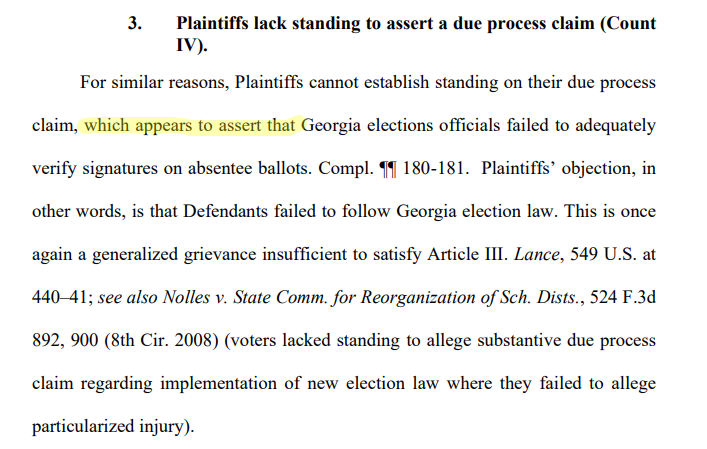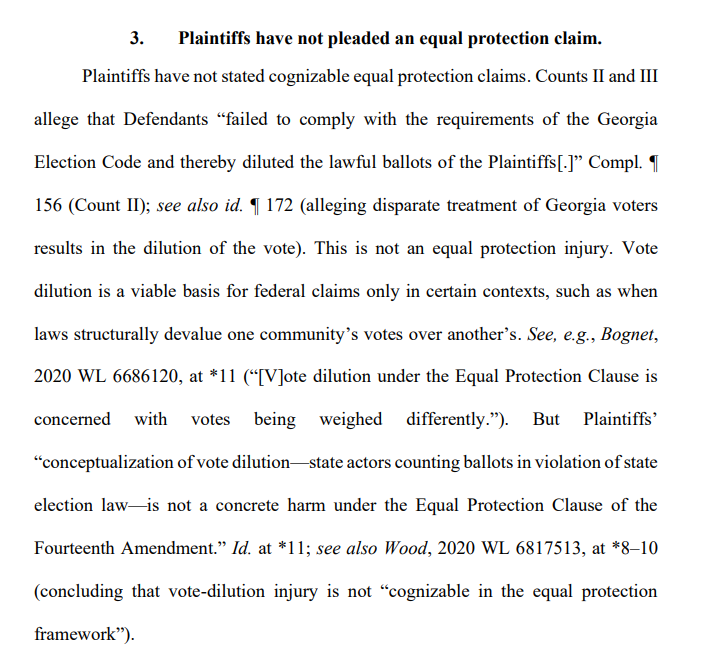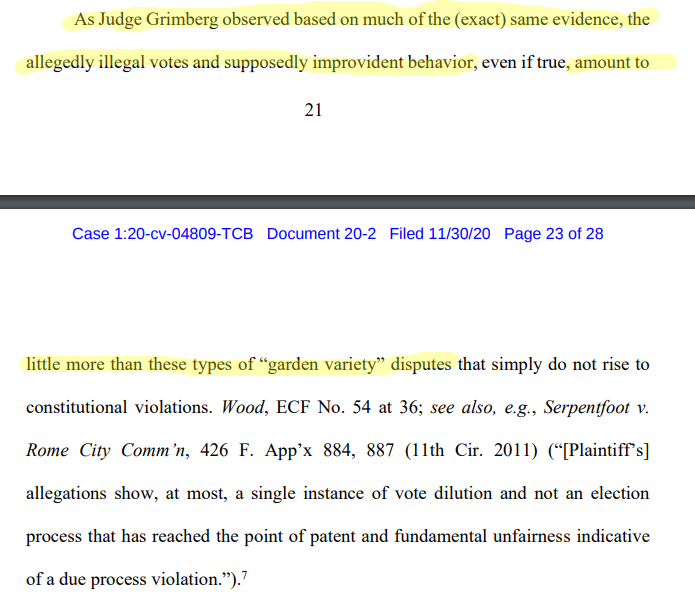
Hey, squid litigation fans, some news: The DNC has filed a motion to intervene in Powell's GA case - basically "look, we weren't sued in this case but our interests are impacted, so let us participate as a Defendant" - along with a proposed motion to dismiss
You can find that proposed motion to dismiss here. courtlistener.com/docket/1869465…
I'll walk you through the brief in a minute - got to finish handling some stuff for a client, and since that's what pays the bills ....
It opens with a professionally done intro, putting this suit into the broader context and driving home that these guys lose at every turn because there's just no fraud or equal protection issue in play. Then it gets to why the claims should be dismissed 



Oh, and even if you ignore all that, Judge, none of what they are pleading in the complaint actually alleges any violations and you *definitely* can't grant the requested relief. And a nice final touch with "you don't want to be the outlier here" 

This does what an intro should: sets the context - the broader story you're trying to tell - and provides the Court with a roadmap for the arguments you'll be making. 1) Standing and prudential standing; 2) wrong court for election contests; 3) laches; 4) the merits; 5) relief
If y'all are used to reading filings from the Trump litigation team, all of this basic competence and coherence may come as a surprise. But this is what legal filings are *supposed* to look like
Next they give a background section I'm probably not going to screenshot for you unless something jumps out at me.
The Georgia election happened, the state did a hand-recount audit, and certified that Biden won by 12,670. A third machine count is currently happening
The Georgia election happened, the state did a hand-recount audit, and certified that Biden won by 12,670. A third machine count is currently happening
The prior litigation: Lin Wood, who is now showing up as counsel for the plaintiffs in *this* suit, filed a basically identical lawsuit in his own name 3 weeks ago.
Oh, this is new - who else didn't know that the infamous "consent decree" had a notice and comment period?
Oh, this is new - who else didn't know that the infamous "consent decree" had a notice and comment period?

Basically, that means that not only was the settlement agreement (recap: when matching signatures, a clerk who thought there was a mismatch needed to have 2 people check that decision and majority [2/3] would rule on whether the signature counted) public since March, but ALSO
that before it went into effect, any member of the public who thought it was a bad idea had the opportunity to say so
(It will, I'm sure, shock you to hear that none of these plaintiffs took advantage of that opportunity)
(It will, I'm sure, shock you to hear that none of these plaintiffs took advantage of that opportunity)
Anyway, back to the brief's run through recent history: your colleague Judge Grimberg crushed Lin Wood's motion for emergency relief like an empty soda can because he lacked standing, was barred by laches, and his claims were toast anyway.
Again, nicely done by the DNC:
Again, nicely done by the DNC:
They're basically saying to this judge (Batten) that he'd have to effectively overrule his colleague to reach a different result. Courts generally don't like to do that. It isn't impossible, but it makes an already high mountain even steeper for the Plaintiffs to climb
Oh, and there's another case - a state court "election contest" apparently raising many of the same claims, filed in Fulton County by a "John Wood" (that's the "counties got grant money to make voting easier" lawsuit filed by the Thomas Moore people) See
https://twitter.com/AkivaMCohen/status/1331807662611320834
Now we get to the meat. The DNC is not particularly impressed by Powell's work here, and they're highlighting the inherent ludicrousness of the plaintiffs' claims. And that this case, more even than the PA one, is a Frankenstein's monster sewn together from dead body parts 



And with that, we get to the legal argument. They start - as they should - with the relevant legal standard. Basically: Judge, these are the rules you need to apply as you consider whether to toss this abomination out of your courtroom 



Picking up from the intro, the DNC starts with standing. (Imagine that: they gave the court a road map, and now they're *following it*. This is an innovative new approach to federal election litigation, and I really hope it catches on).
We start with an argument that anyone following these cases has seen over and over again from courts: random people can't just come to court and argue that a state violated the Elections/Electors clauses, which commit certain power over elections to state legislatures 

That's not how this works. The only people harmed by, say, a state court changing Presidential election law in a way that violates the exclusive prerogative of the legislature *is the legislature*.
It's the legislature that was harmed, for the same reason that if you trespass on my property, I'm the only one who can sue you for that: it's *my* rights that you're violating
Here, if the allegation is that the Legislature's right to control the process of the election is being violated, then the Legislature is the one harmed, and it's the one that has to sue.
So if this is well established, what's the Plaintiffs' argument? Carson v. Simon, an 8th circuit case that held, this year, that party nominees to be Presidential electors, unlike members of the general public, are "candidates" in the election and therefore have standing to
As you can see, the decision turned on a very specific quirk of Minnesota law: it described party electors as "candidates".
Georgia law, the DNC points out, doesn't do that.
Georgia law, the DNC points out, doesn't do that.

Also, they argue, there's a circuit split and the 8th Circuit is out there on its own on this, and wrong. Other courts have held that even candidates don't have standing to assert an injury from a violation of the *legislature's* rights (full disclosure: I agree) 



A side note here: This circuit split is the first - the very first - thing in any of these cases that might justify SCOTUS review. It's a federal question where the circuits are going in different directions, and an important enough issue that SCOTUS could conceivably want to
hear it and announce a uniform rule.
Given the procedural posture of everything, though, there's essentially no chance any ruling on that issue could even conceivably impact the 2020 election. There's just not enough time left, especially since all finding standing would do is
Given the procedural posture of everything, though, there's essentially no chance any ruling on that issue could even conceivably impact the 2020 election. There's just not enough time left, especially since all finding standing would do is
send a dismissed case back down to the District Court to begin considering the merits
Back to the brief. Also, your honor, even if you want to say these electors have been hurt by the alleged violation of the legislature's right to control the elections, we generally don't let people bring claims based on *other people's* rights. 

So the Electors/Elections clause claim (that by entering into the settlement agreement with procedures for signature matching Georgia unlawfully trespassed on the legislature's rights to set election procedures) is toast for lack of standing.
So is the Equal Protection claim:
So is the Equal Protection claim:

In fact, this court just said as much in Lin Wood's crazy claim.
(Side note: You can't be making that concession at oral argument and have any hope of success. They needed a better answer for this, and they just don't have one. They lose)
(Side note: You can't be making that concession at oral argument and have any hope of success. They needed a better answer for this, and they just don't have one. They lose)

And the "you didn't actually verify signatures" due process claim fails for the same reason (note that, like the rest of us, the DNC is having a hard time trying to match up Powell's rambling nonsense to specific legal theories) 

Oops, almost broke the thread. Will continue replying here, but this was supposed to be the next tweet
https://twitter.com/AkivaMCohen/status/1333494805985456129
Now, the jurisdictional problem. Count V of Powell's complaint brings claims under Georgia's election contest statute.
One problem: The statute (as @questauthority guessed) says those claims need to be brought only in state court. Which this Federal District Court is not.
One problem: The statute (as @questauthority guessed) says those claims need to be brought only in state court. Which this Federal District Court is not.

Folks: That's the entire section of the brief on election contests.
"Your Honor, the law expressly says you can't hear this claim" is pretty fucking dispositive, they don't need any more.
"Your Honor, the law expressly says you can't hear this claim" is pretty fucking dispositive, they don't need any more.
If Powell is minimally strategically competent, her response on this will be "yes, we screwed up in our haste, you can dismiss this count." When you're already alleging wild conspiracy theories, you have no credibility to spare trying to defend a claim that's this dead on the law
Judging by the quality of her work to date, I predict that is not what she will do.
Instead, she'll argue that this is a very important case, and Federal courts generally have "pendent" jurisdiction (basically, they can consider state law claims that are intertwined with federal
Instead, she'll argue that this is a very important case, and Federal courts generally have "pendent" jurisdiction (basically, they can consider state law claims that are intertwined with federal
law claims), and that it would be a waste of judicial resources to have these claims pending in two different courts - none of which will make a damn bit of difference where Georgia's statute says "Georgia election contests can only happen in Georgia state courts"
Now, we get to another familiar friend: Laches. They should have brought any claims based on the signature match settlement in March, or between March and the election. They've got no excuse for the delay, and the delay harmed millions of Georgia voters. 





Again, what this laches case looks like
Finally, to the merits: the Plaintiffs' complaint fails to state a claim for which the court can grant relief
Again, we're in Twiqbal's wonderful world of plausibility, with the added bonus of this being a fraud complaint, so the standards are actually *higher* 

You know, when you put it all out there like that ...
I mean, it really is worth taking a step back and focusing on how delusional this all is. If you traveled back to November 1, 2020, and said to as MAGA a person as you could find "I'm worried about Georgia; I think Governor Kemp and the Sec of State are rigging it for Biden" ...
They would have looked at you like you had two heads. Or worse, said "Pelosi is really good for the country"
This claim is absolutely crazy. Bonkers. Totally nuts. It's *exactly* the type of conspiratorial lunacy Twiqbal was designed to weed out.
This claim is absolutely crazy. Bonkers. Totally nuts. It's *exactly* the type of conspiratorial lunacy Twiqbal was designed to weed out.
I'll be honest, I would have expected some more discussion of the specific allegations here - this is the end of that section and unless they come back to it later, they may regret this choice 

Next, the Elections/Electors clause. There's no claim here, because part of the Legislature's rights under the constitution is to delegate authority to officials like the Secretary of State to make decisions like these, and Georgia's legislature did that 





Now the equal protection claim: basically, the Third Circuit got this right already; listen to it. You can't transform garden variety claims that election procedures weren't followed into an equal protection claim, no matter how hard or quickly you wave your hands 





On to the due process claim: same issue - you can't turn state law claims into constitutional claims just by saying so. You need some sort of widespread disenfranchisement - which isn't alleged here 





And that's it for this brief. Solid, but I think they left some stuff on the table
Got a lot of versions of this question, so here's my answer: You're ceding the field to the other side to describe the affidavits & argue "they are attacking plausibility, but we submitted expert declarations and eyewitness statements they don't challenge"
https://twitter.com/matir/status/1333501556856029185
And when they do that, you'll need to deal with them on reply, when you have less space and there will be an argument that you can't raise new arguments in a reply brief. I don't think they needed to get into the weeds on every detail, but I do think they needed to do more
• • •
Missing some Tweet in this thread? You can try to
force a refresh











